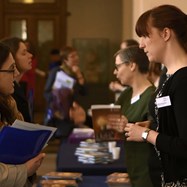UCAS admissions data
09 June 2016
Commenting on the UCAS admissions data publication, Russell Group Director General Dr Wendy Piatt said:
“The UCAS statistics published today show no evidence of bias within the admissions system. Ensuring our doors are wide open to talented and able students from all backgrounds really matters to us. The root causes of underrepresentation are complex and a much wider range of factors need to be taken into account to fully understand the problem.
“As UCAS points out, their analysis does not take into account a range of key information used in admissions. Crucially it does not account for A-level subject choice or grade requirements, which are often fundamental conditions for acceptance onto a degree course. It also does not consider personal statements, academic references or admissions assessment and interview performance, which are all factors that help admissions tutors determine whether candidates are suitable for a course, passionate about their subject and likely to succeed.
“Without the full context of individual applications, the data published by UCAS today tells only part of the story; a much fuller picture is required to understand why some students are not applying to or winning places at leading universities.
“Our universities are working tirelessly to encourage bright candidates to apply. We want talented students from all backgrounds to know that with the right grades in the right subjects a place at our universities is well within their reach. In 2016-17 the 20 Russell Group universities in England will be investing £243 million from additional fee income alone on scholarships, fee waivers, bursaries and outreach activities aimed at the most disadvantaged students. These outreach activities include working closely and extensively with teachers and schools particularly in deprived areas to encourage more disadvantaged students to apply to our universities and maximise their chances of winning a place. We can also see that real progress has been made as 18 year olds from disadvantaged backgrounds were 39% more likely to enter more selective universities in 2015 than in 2011.”
Notes to editors
- Department for Education destination data published in January showed that the number of students eligible for free school meals going to Russell Group universities has increased every year since 2010. In 2013, almost 12% of the students (1820) eligible for free school meals who went into higher education went to a Russell Group university, up from 7.5% (910) in 2010.
- The numbers of black, Asian and Mixed race students entering Russell Group universities have all increased since 2010:
- Numbers of black students accepted by RG universities have gone up by 62%, from 1,690 in 2010 to 2,740 in 2015.
- Asian students accepted at RG universities have increased by 28%, from 7,285 in 2010 to 9350 in 2015.
- Numbers of ‘Mixed’ ethnicity students accepted at RG universities have gone up by 43% in the same timeframe, from 2,760 to 3,940.
- The UCAS figures only look at 18-year-old applicants. We know that many black students at Russell Group universities apply when they are over 21, which means they are not included in UCAS datasets.
- Students eligible for free school meals are significantly less likely to achieve 5 or more A*-C grades at GCSE including English and Maths than their more advantaged peers (33.1% vs 60.9% in 2015 according to DfE data published earlier this year). They are also significantly less likely to achieve the EBacc than their more advantaged peers (9.9% vs 26.6%).
- Fewer than 8,500 students eligible for Free School Meals in 2010/11 took three A-levels. Of these students, only 546 achieved three or more A* or A grades.
- In 2015 only 710 young black applicants applied with grades equivalent to AAA or better. Just 16% of black students applied with grades equivalent to AAB or better compared to 30% of Asian students, 32% of mixed ethnicity students and 32% of white students.
- The Sutton Trust’s Subject to Background report (2015) found that nearly twice as many advantaged as disadvantaged students identified as high achieving at age 11 go on to take one or more of the A-level subjects more frequently required for entry to degree courses than others.
- Research from the Sutton Trust has also shown independent school applicants are more likely to submit statements that are carefully crafted, written in an academically appropriate way, and filled with high status, relevant activities.
- In 2016-17, the 20 Russell Group universities in England alone will be investing £243 million in scholarships, fee waivers, bursaries and outreach activities aimed at the most disadvantaged - with additional investments being made across Scotland, Wales and Northern Ireland.
- Our guide Informed Choices, first published in 2011, includes advice on the best subject combinations for a wide range of university courses as well as advice on the best choices for students if they don’t know what they want to study after school and need to keep their options open.
- The Russell Group holds biennial conferences for teachers at schools in disadvantaged areas or with low rates of progression to higher education. The conferences cover a range of topics including subject choice, the application process and writing references and personal statements. To widen the reach of these conferences, materials and presentations have been developed into an online resource to help teachers who are unable to attend. This resource, Advancing Access, will be launched later this year.
- The Russell Group report, Opening Doors, Understanding and overcoming the barriers to university access, published in 2015,and accompanying films examine the root causes of under-representation of students from disadvantaged backgrounds, and give examples of what Russell Group universities are doing to help tackle the problem.
-
Hamir Patel
hamir.patel@russellgroup.ac.uk
020 3816 1316
-
Hollie Chandler
Hollie.Chandler@russellgroup.ac.uk
020 3816 1307
 X
X


